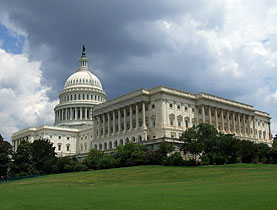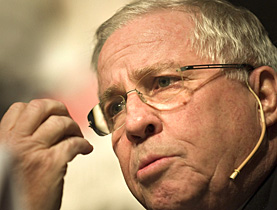Switzerland tends its image after damage is done

The Swiss government is to spend millions lobbying Washington and Berlin, just as the issues that got the country into trouble are coming to a head or are winding down.
Officials have allocated SFr2 million ($1.88 million) for 2009 and SFr2.5 million for 2010, which they say will be funnelled into existing image-promotion programmes and spent on political advocacy.
Switzerland’s banking secrecy laws have come under attack from both sides of the Atlantic, forcing the country to relax the decades-old tradition. Last Friday, the Swiss came to a provisional deal with the United States Internal Revenue Service (IRS) to drop charges against bank UBS.
The foreign ministry says Switzerland does not have a “general image problem” in the United States but admits that its standing among US lawmakers, and in some media circles, warrants the campaign.
The government last wrote big cheques for lobbying a decade ago, during the dormant Nazi-era bank account scandal. From 1998 to 1999, Switzerland spent $500,000, according to congressional filings.
“The goal of these efforts is the maintenance and improvement of our actual image and an increased comprehension of the Swiss point of view among American opinion makers,” foreign ministry spokesman Erik Reumann told swissinfo.ch in an email.
“Lobbying on a precise issue or when you are on the defensive – literally after having lost partners and friends on the way – [is] difficult, ” said Roman Geiser, head of the Swiss practice of Burson-Marsteller, an international public affairs firm.
“It needs a soft diplomacy approach in explaining positions, in making the distinction in very complex matters and then it needs a much more proactive approach in communications or public relations… but it needs to be flanked by an integrated communications concept and very coherent messaging, which hasn’t been the case so far,” he told swissinfo.ch.
Cabinet confusion
“Of course it’s late and it’s fixing things when they have gone wrong before,” said Peter Briner, a senator from the centre-right Radical Party and president of the Parliamentary Association Switzerland-USA.
“PR agencies can never replace good politics. So we should have done it in a way that no PR agencies were necessary.”
Surveying the damage, critics point to organisational problems within the cabinet. Banks, their secrets and their future success touch the portfolios of four of Switzerland’s seven cabinet ministers. They never appointed an exclusive messenger.
Finance Minister Hans-Rudolf Merz, who also holds the rotating presidency, Economics Minister Doris Leuthard, Foreign Minister Micheline Calmy-Rey and Justice Minister Eveline Widmer-Schlumpf have all spoken publicly about the relationship with the US.
Defence Minister Ueli Maurer, whose portfolio is basically unaffected, came to the understanding that the best defence was a good offence. In July, Maurer, of the rightwing Swiss People’s Party, told a Sunday newspaper that the US was “unreliable” as a negotiating partner.
“From what we have observed so far, it’s too many people, it’s not coherent, there doesn’t seem to be an underlying or overarching strategy,” said Geiser of Burson-Marsteller.
“There is no clear leadership, there is no clear messaging and there is no coherent strategy around the key issues of us being positioned as a tax haven, which needs explanation.”
Said the foreign ministry: “In general, multiple voices have to be seen as an opportunity when it comes to building up trust and reliability. However, these voices have to be coordinated within a consistent communication strategy.”
Peter Briner is less enthusiastic. “There were too many actors, too many players trying to explain things, which was hardly a good strategy,” he said.
“Damage underestimated”
Briner told swissinfo.ch that although the dispute over banking secrecy was “based on a lot of misunderstanding”, the cabinet had underestimated the damage it would cause.
Simonetta Sommaruga, a senator from the centre-left Social Democratic Party, in March accused the government of falling asleep. “The cabinet has had ten years to prepare for these challenges, but it turned a blind eye,” she said.
For its part, the foreign ministry says its efforts to maintain relationships in the US have been “considerable”.
Geri Müller, a Green parliamentarian and the head of the House of Representatives Foreign Affairs Committee, would rather have seen the government hold off on its campaign.
“The negotiations between the United States and Switzerland are not finished. And nobody knows what will be the end of the discussion,” he said. Like his colleague on the centre-right, Müller faults the cabinet but for a different reason.
Switzerland’s international critics say secret banking attracts tax cheats and pilfered money, but much of the criticism from within Switzerland has been over the government’s failure to “explain” banking secrecy, as though if it were explained, it would be accepted.
“The best communication is to change the system,” Müller said. “If you change the system, if it’s clear that we’re not defending criminals, then we have a good position.”
Justin Häne, swissinfo.ch
Switzerland’s campaign will not be aimed at the US public, the foreign ministry said.
A survey released by swissinfo.ch and the SonntagsBlick newspaper last week indicated that most Americans continue to have a positive view of Switzerland.
Geri Müller, Peter Briner, Roman Geiser and the foreign ministry’s Erik Reumann all agree.
Experts say that banking secrecy is not an issue that mainstream Americans keep up-to-date with.
Those who do, know that on July 31, the Swiss got some more breathing room.
Bank UBS, which has been embroiled in a legal fight over its business practices in the US, had faced the prospect of being forced to hand over the names of tens of thousands of clients and suspected tax cheats.
Arguing such an order would force UBS to violate its laws, the Swiss government involved itself heavily in the case.
Then the government and the IRS came to a provisional settlement, which it said would not violate the principle of banking secrecy.
The two sides have until August 10 to work out the details.
Switzerland has also negotiated new double taxation agreements with several European governments, as well as with the US, over the past few months.
As for the new campaign, the foreign ministry says it is coordinating with private sector organisations but has not provided details.
Thomas Sutter, a spokesman for the Swiss Bankers Association, said the association is in touch with the government but keeps its lobbying separate.

In compliance with the JTI standards
More: SWI swissinfo.ch certified by the Journalism Trust Initiative



You can find an overview of ongoing debates with our journalists here. Please join us!
If you want to start a conversation about a topic raised in this article or want to report factual errors, email us at english@swissinfo.ch.